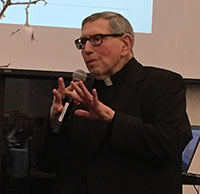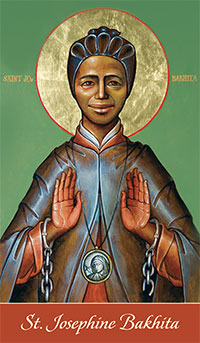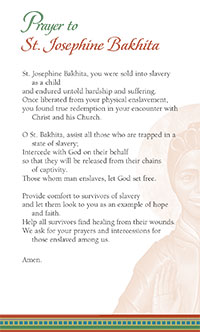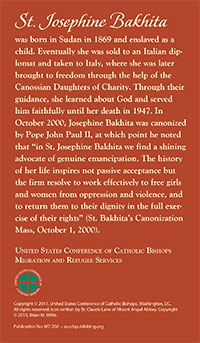 GREENSBORO — “Life is a gift from God and we are stewards of our lives, not the owners.”
GREENSBORO — “Life is a gift from God and we are stewards of our lives, not the owners.”
That was the message from Father Charles Vavonese, who spoke at a presentation on end-of-life decision-making and Catholic moral teaching at St. Pius X Church in Greensboro Jan. 15.
Father Vavonese serves as a chaplain with the Order of Malta in Syracuse, N.Y., and is the author of “I am the Resurrection of Life, A Resource for Catholic Moral Teaching on End-of-Life Issues.” His talk, sponsored by the Order of Malta of Central North Carolina, drew more than 100 parishioners from St. Pius X Parish, as well as local dames and knights of Malta.
Although “as Catholics we are not morally bound to prolong the dying process by using every medical means available,” Father Vavonese noted, “educating our population is critical for being able to give people the options to forgo physician-assisted suicide.”
We need to think, he said: “Are we prolonging the person’s death, or offering them life?”
Like other end-of-life experts in the Church, including the National Catholic Bioethics Center, Father Vavonese encouraged people to choose someone to be their health care proxy or exercise power of attorney, someone who knows what their wishes are and what the Catholic faith teaches.
“We need to find a way to communicate what our wishes are when we are unable to do that for ourselves,” he said.
Father Vavonese covered palliative care, Do Not Resuscitate orders, and what constitutes ordinary versus extraordinary care.
With extraordinary care, he said, we are not obligated to treatments offering no reasonable hope of benefit, or treatments that involve excessive hardship, especially when a patient is near death.
“We strive to give our families many, many gifts, and this one – the gift of making known our final wishes – is one of the most important,” said Debora Ritzel, parishioner and Dame of Malta since 2016.
“Even though end-of-life procedures can be quite complicated, the presentation was made in a way that didn’t seem threatening, that there are measures one can take which are clearly spelled out in the Catholic Church. And, even if one chooses the most difficult decision to be made, if that individual follows the best medical advice in conjunction with Catholic moral teaching, he or she should find comfort that they have honored both man and God,” said parishioner Tita Wofford.
“At a time when there are so many voices contrary to the Gospel of life, we thought it was important as Knights and Dames of Malta to invite Father Vavonese to speak to our community in defense of our faith – particularly as it relates to end-of-life issues,” said Monsignor Anthony Marcaccio, pastor. “Most of our people are totally unprepared for the decisions at the end of life.”
“We are people of hope with a firm faith in the promise of Christ and His resurrection,” he said. “We pray, think, talk and sing about heaven, but how many of us talk about that transition from this life to the next? When it comes to this subject or even the discussion of funeral preparations, denial is a powerful dynamic.”
He continued, “I learned from my own father’s death that one of the most loving gifts he could give us was a clear articulation of what he wanted going forward with his medical treatment. A clear, real, loving and Catholic conversation can ease the burden of responsibility that falls to the one you designate to direct your health care when and if you become incapacitated. A carefully written legal document may be helpful in knowing one’s desired course of medical care, but pales in comparison to having designated a compassionate individual whose conscience has been formed by our faith.”
“Given the advances in health care and the nuances involved in each person’s particular situation, it is critical to have our folks vest the legal, life respecting, decision-making power in a person, not in a document,” Monsignor Marcaccio emphasized. “For example, some of the same procedures classified as extraordinary care, may in different circumstances be viewed either as a temporary situation that leads to recovery or as an unnecessary burden that offers no hope of remedy. From my experience, both personally and pastorally, I beg people not to put off these frank and sometimes difficult conversations. I am so grateful to Father Vavonese for his presence and presenting us with a wide range of resources to start that very discussion.”
— Georgianna Penn, correspondent
Get more information
At www.ncbcenter.org: The National Catholic Bioethics Center’s website has much more information on end-of-life care and decision-making, including two documents Father Charles Vavonese recommended referencing, “The Ethical and Religious Directives for Health Care Services” and “Declaration on Euthanasia”
At www.catholicnewsherald.com: Plan end-of-life care and funeral arrangements with your family using the Catholic News Herald’s Catholic funeral planning guide
Who is St. Josephine Bakhita?
Born in the late 1800s in Sudan, she was kidnapped by slave traders and sold numerous times throughout her life.
She eventually ended up in custody with the Canossian Sisters and came to know Christ for the first time. When she was called to go back to her captor, she pleaded to stay with the sisters and by the time her case got to court, slavery was outlawed in Sudan. Canonized in 2000, she is the patron of human trafficking victims. Feb. 8 is her feast day and the International Day of Prayer and Awareness of Human Trafficking.
Millions of people across the world each year fall victim to human trafficking – modern-day slavery.
On Feb. 8, Catholics all over the world will gather in prayer to raise awareness about this great evil. Through prayer, we not only reflect on the experiences of those who have suffered through this affront on human dignity, but also comfort, strengthen and help to empower survivors.
Catholic Charities Diocese of Charlotte’s Respect Life Program’s anti-trafficking task-force is collaborating with the Sisters of Mercy to host a networking, fair trade sale and prayer service from 7 to 8:30 p.m. Friday, Feb. 8, at the Sisters of Mercy Convent in Belmont. All are welcome to attend.
For more ideas of how to incorporate honoring St. Bakhita and praying for the victims of human trafficking on Feb. 8, go to the U.S. Conference of Catholic Bishops’ website, www.usccb.org, to learn about its anti-trafficking program.
— Jessica Grabowski, Special to the Catholic News Herald. Jessica Grabowski is the Respect Life program director for Catholic Charities Diocese of Charlotte.
Related: St. Josephine Bakhita honored on Feb. 8



Prayer Service for Victims of Human Trafficking set for Feb. 8 in Belmont
Feb. 8, the feast day of St. Josephine Bakhita, has been designated by the Pontifical Council for Justice and Peace and the International Union of Superiors General as an annual day of prayer and awareness against human trafficking.
On Friday, Feb. 8, from 7 to 8:30 p.m., at Sacred Heart Convent in Belmont, the Sisters of Mercy and Catholic Charities are co-sponsoring a Prayer Service for Victims of Human Trafficking and a resource sharing event. Details about this event can be found at www.ccdoc.org/respectlife.
Turn on the light. Help stop human trafficking.
Catholic Relief Services fights human trafficking worldwide, working with schools, community groups and families to teach people how to stay safe and become more self-sufficient so traffickers can’t find their way in.
CRS also provides temporary housing and health care for those who have escaped trafficking. Help CRS fight human trafficking by purchasing CRS Survivor Kits for victims of human trafficking and Prosperity Candles.
A Prosperity Candle supports the work of CRS to shine a light on, and put an end to, human trafficking and modern-day slavery. For more information, go to www.crs.org/slavery-human-trafficking.

